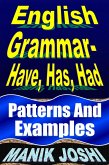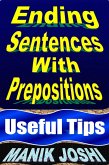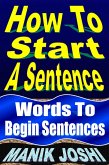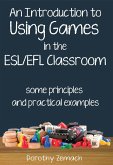A collocation is a combination of words that are often used together and sound natural together
J.R. Firth, a British linguist first used the term "collocation" in its linguistic sense. These combinations are natural and sound "right" to native English speakers. In contrast, other combinations may be unnatural and sound "wrong".
You should say "light rainfall" and not "skinny rainfall"
You should say "take a printout" and not "perform a printout"
You should say "dog barks" and not "dog yells"
You should say "don't commit a crime" and not "don't do a crime"
You should say "sweet memory" and not "syrupy memory"
You should say "strong criticism and not "muscular criticism"
Types of Collocations
Some verbs often have particular adverbs, nouns or prepositions which regularly collocate with them. Likewise, some adjectives often have particular adverbs, nouns or prepositions which regularly collocate with them. Similarly, some nouns often have particular adjectives, adverbs or prepositions which regularly collocate with them.
Following are the main types of collocations:
01. adjective + noun collocations (e.g.: bright future)
02. adjective + preposition collocations
(a). adjective + about (e.g.: sure about)
(b). adjective + at (e.g.: skilled at)
(c). adjective + by (e.g.: shocked by)
(d). adjective + for (e.g.: famous for)
(e). adjective + from (e.g.: different from)
(f). adjective + in (e.g.: fluent in)
(g). adjective + of (e.g.: aware of)
(j). adjective + on/upon (e.g.: intent on)
(i). adjective + to (e.g.: answerable to)
(j). adjective + with (e.g.: impatient with)
03. adverb + adjective collocations (e.g.: keenly awaited)
04. adverb + noun collocations (e.g.: timely justice)
05. adverb + preposition (from/of) collocations (e.g.: far from)
06. adverb + verb collocations (e.g.: legally entitle)
07. noun + adjective collocations (e.g.: disease-free)
08. noun + noun collocations (e.g.: awareness rally)
09. noun + preposition collocations
(a). noun + about (e.g.: confusion about)
(b). noun + against (e.g.: crime against)
(c). noun + at (e.g.: displeasure at)
(d). noun + between (e.g.: connection between)
(e). noun + for (e.g.: approval for)
(f). noun + from (e.g.: exclusion from)
(g). noun + in (e.g.: expert in)
(h). noun + into (e.g.: influx into)
(i). noun + on/upon (e.g.: consent on)
(j). noun + of (e.g.: decline of)
(k). noun + to (e.g.: attempt to)
(l). noun + towards (e.g.: tendency towards)
(m). noun + with (e.g.: discussion with)
10. noun + verb collocations (e.g.: lions roar)
11. verb + adverb collocations (e.g.: decide fast)
12. verb + noun collocations (e.g.: feed the bird)
13. verb + preposition collocations
(a). verb + about (e.g.: argue about)
(b). verb + against (e.g.: conspire against)
(c). verb + at (e.g.: excel at)
(d). verb + between (e.g.: mediate between)
(e). verb + by (e.g.: increase by)
(f). verb + for (e.g.: appear for)
(g). verb + from (e.g.: build from)
(h). verb + in (e.g.: dissolve in)
(i). verb + into (e.g.: carve into)
(j). verb + of (e.g.: disapprove of)
(k). verb + off (e.g.: drain off)
(l). verb + on/upon (e.g.: chew on)
(m). verb + out (e.g.: straighten out)
(n). verb + to (e.g.: apply to)
(o). verb + with (e.g.: bargain with)
14. other useful collocations
(a). adjective + adjective (e.g.: cool-headed)
(b). adjective + adverb (e.g.: close together)
(c). adverb + adverb (e.g.: almost certainly)
(d). noun + adverb (e.g.: environment-friendly)
(e). verb + adjective (e.g.: remain courageous)
Dieser Download kann aus rechtlichen Gründen nur mit Rechnungsadresse in A, B, CY, CZ, D, DK, EW, E, FIN, F, GR, H, IRL, I, LT, L, LR, M, NL, PL, P, R, S, SLO, SK ausgeliefert werden.









